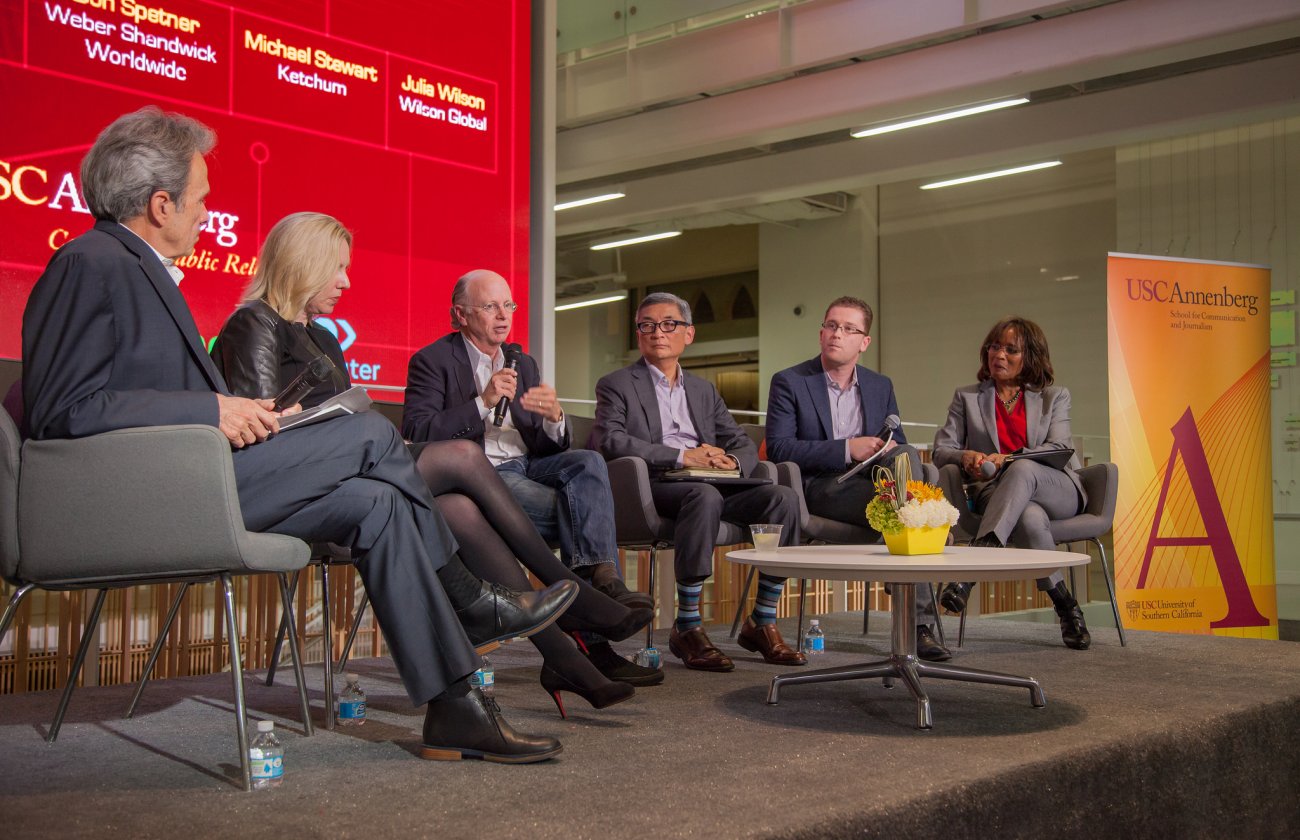By Jeremy Rosenberg
On a night that began with great expectations and ended with a standing ovation, USC Annenberg hosted this week an exclusive advance screening and follow-up panel discussion about the forthcoming PBS documentary, "The Powerbroker: Whitney Young's Fight For Civil Rights."
The film, scheduled to air nationally on Monday, Feb. 18, was a decade-long labor of love for executive producer Bonnie Boswell.
"This was a really challenging film to make," said Boswell, a prominent broadcast journalist who is also Young's niece.
"Powerbroker" tells the extraordinary and all-too-often overlooked story of a consummate insider who in 1961 became executive director of the National Urban League.
Young (1921-1971) counseled three U.S. Presidents as well as scores of corporate CEOs. Against significant odds and with a turbulent and divided era as backdrop, Young brokered deals and pushed through proposals that led to increased economic, educational and health care opportunities for African Americans and for all Americans.
Young's legacy includes convincing John F. Kennedy to support the March on Washington; proving intellectual influence and pragmatic strategic advice to Lyndon B. Johnson during the successful efforts to pass the Civil Rights Act and War on Poverty programs such as Head Start; and even convincing Richard Nixon to at one point budget more money towards some of the initiatives Young favored than Kennedy and Johnson had budgeted combined.
"Whitney Young's genius was he knew how to accomplish what other people were merely for," the film shows Nixon saying while delivering a eulogy at a Kentucky cemetery for Young, who drowned at age 49 while swimming in Lagos, Nigeria.
Despite – or likely because of his collaborations that others who were more outwardly radical scorned – "Powerbroker" posits Young as a forgotten champion of the Civil Rights Movement. The film's narration, as read by activist and actor Alfre Woodard, labels Young as the Movement's "unsung hero."
"That's why I wanted to do this story; I wanted to lift up a person who really worked behind the scenes," Boswell said in an interview conducted in the Annenberg East Lobby, where two hundred or so Los Angeles community and cultural leaders as well USC Annenberg students, faculty and administrators mingled prior to heading downstairs to the Annenberg Auditorium for the screening.
"Powerbroker" blends archival video, photos and a White House phone recording with a few animations and dozens of contemporary interviews with nationally known activists, scholars and other leaders. That list ranges from Henry Louis Gates, Jr. – who in the film hails Young as "a prophet" – to John Hope Franklin; from Dorothy Height to John Lewis; and from Amiri Baraka to Howard Zinn.
Activist and actor Ossie Davis is also featured in "Powerbroker." "I couldn't tell a young person to become another Malcolm X or Martin Luther King, Jr.," Boswell said Davis told her. "But I could tell them to become another Whitney Young."
That sentiment clearly reached some of those assembled. Public Diplomacy first year graduate student Neftalie Williams attended the screening and discussion. "I thought it was fantastic to see such a pragmatic leader," Williams said. "That's something we sometimes seem to be missing."
Williams also noted that Civil Rights era discourse often involve a Malcolm X and Martin Luther King, Jr. dialectic. "We can see a different standpoint, a different place where we can be working," Williams said. "Everyone wants jobs – especially in this economy right now. This is a blueprint for how you can make change on another level."
After the screening, USC Annenberg Dean Ernest J. Wilson III welcomed a trio of special guests for a public conversation he then moderated. Those guests were: Pastor James M. Lawson, a longtime civil rights leader and strategist; John Mack, former president of the Los Angeles Urban League; and Francille Rusan Wilson, associate professor of American Studies and Ethnicity and History at USC Dornsife.
The panelists and moderator all saluted Boswell and her team for their accomplishment. "Powerful movie," Dean Wilson said. "An outstanding piece of work," Mack raved. "I was very impressed," Lawson said, adding: "I'm pleased that it is a provocative film and inclusive of so many of the issues that besiege our time."
Rusan Wilson commended Boswell "for offering a nuanced and unvarnished look at her uncle" – something she pointed out that not every filmmaker could do. Rusan Wilson also said that she herself had been critical of Young during the '60s – and that Young had been helped by criticism from the left.
"We can see in hindsight that there can be movements of great change," Rusan Wilson said. "The Urban League was founded in 1910 and the moment that it could get black people in corporate jobs didn't come along until Whitney Young."
John Mack, meanwhile, said that Young was his mentor. The pair met when Mack was a student and Young was the Dean at the Atlanta University School of Social Work. Their relationship continued when Mack joined the Urban League.
"I see him, and I always viewed him, as a pragmatic idealist," Mack said of Young. "He had the big vision and the ideals but also he was someone who was a good strategist about how to solve problems and get things done."
And what does Mack desire people who watch "Powerbroker" to learn about Young?
"I would hope that the students here at the University of Southern California and other young people of this generation would gain an appreciation of this giant," Mack said. "He was clearly one of the great leaders who made a major, major mark in advancing the cause of Civil Rights throughout America and in helping to change America."









